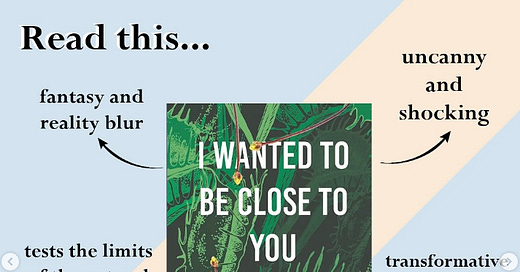What is the 'folk horror' genre and why is everyone obsessed with it right now?!
And our Summer Reading Reccs are in!
Good morning lovely Scribblers,
I hope you had a great week? I had a very exciting day in London with Perminder Mann (Bonnier Books CEO) who will be mentoring me on business strategy and much more, and visiting political and indie-supporting bookshops around central London. Seeing the glamour and scale of the industry, and zooming out to reflect upon it, has two effects on me - one being, ‘oh wow, how can any books stand out here’, and the second being, ‘there are SO many opportunities to reach readers and to grow here’. But I’m very much planning on staying a northerner, don’t worry!
We’ve released a Summer reading list (what to read next if you’ve read any of the classics below…)
And Rebecca Foster compares ecopoetry collection ‘The Soul We Share’ by Ricky Ray to Mary Oliver! I still have a few limited edition postcards and pressed Autumn leaves for post outs of this one…
Today I’m handing over to Liam Bell, Creative Writing lecturer at Stirling University and the author of ‘Man at Sea’ and ‘The Sleepless’ to talk about a genre which you may or may not be aware of: ‘folk horror’.
Fancy joining us online? Liam Bell and myself will be taking you on a deep dive into the minds of psychopathic characters. From character construction to crafting narratives that keep you hooked to the very end, this is the perfect event for psychological thriller fans and those looking to write their own thriller. In conversation with Louisa Wagstaff.
For a night that you truly won’t forget, join us online on Tuesday 13th August at 6:15PM. Tickets here
Folk horror, a captivating subgenre of horror fiction, has deep roots in British culture and landscape. It emerged as a distinct category in the late 1960s and early 1970s, blending elements of traditional folklore, pagan rituals, and the eerie atmosphere of rural settings to create uniquely unsettling narratives.
In British cinema, folk horror gained prominence with what is often called the "Unholy Trinity" of films: "Witchfinder General" (1968), "Blood on Satan's Claw" (1971), and "The Wicker Man" (1973). These works set the tone for the genre, exploring themes of isolation, ancient beliefs clashing with modernity, and the sinister undercurrents lurking in seemingly idyllic countryside locales.
In literature, folk horror has seen a resurgence in recent years, with authors like Andrew Michael Hurley, Sarah Moss, and Catriona Ward crafting stories that tap into primal fears and the uncanny nature of rural Britain. These works often draw on the rich tapestry of British myths and legends, weaving them into contemporary narratives that explore the darker aspects of human nature and our relationship with the natural world.
Folk horror continues to fascinate audiences and creators alike, offering a unique lens through which to examine British cultural identity, history, and the enduring power of ancient beliefs in the modern world. Over to you, Liam!
Liam Bell:
When pitching psychological thriller ‘The Sleepless’ to agents, the novel was described as a ‘thriller with a folk horror atmosphere’, but what does the second half of that pitch-line mean? What is folk horror as a subgenre? And how did it influence the writing of a novel set on the rural west coast of Scotland, about a cult who believe that we should all be surviving on less sleep and striving for an enlightened wakefulness?
In brief: ‘The Sleepless’:
Grafton is a single dad who works in local radio, but he’s always dreamt of being a ‘real’ journalist. When he gets a whiff of a story – a Scottish commune whose residents believe that sleep is a social construct – he decides to investigate… something tells him ‘the Sleepless’ might finally provide answers about his wife, Liz, who abandoned him and their son Isaac for a similar cult in India.
As Grafton is drawn deeper into the extreme world of the Sleepless, Liz reappears, and Grafton has to race to save both himself and his son…
It’s a subgenre I’ve always loved and one which the writer Adam Scovell has, helpfully, tried to define for us with his ‘folk horror chain’ which proposes four elements:
Landscape
Isolation
Skewed Belief Systems and Morality
A Happening or Summoning.
Keep reading with a 7-day free trial
Subscribe to A Publisher with a Conscience: Fly on the Wall Press to keep reading this post and get 7 days of free access to the full post archives.






